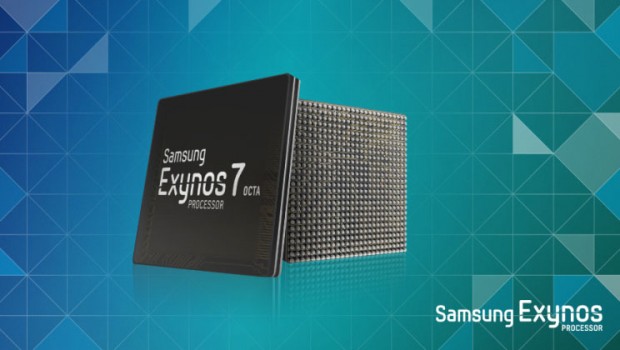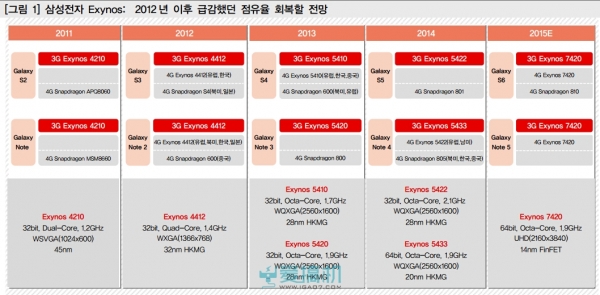Fixed Or Not, The 20nm Snapdragon 810 Will Have To Compete With The 14nm Exynos 7
After many reports that Samsung is not happy with the thermal performance of the Snapdragon 810, Qualcomm seemed willing to update the chip specifically for Samsung. That updated chip, even if completely fixed, may not even arrive on time for the Galaxy S6, though.
However, there's an even bigger problem for Qualcomm. Even a fixed 20nm Snadragon 810 may not be enough to compete against Samsung's upcoming 14nm FinFET Exynos 7 Octa (7420).
According to a new report from Korea, Samsung's Exynos 7420 can have its Cortex A57 cores clocked at 2.1 GHz, while the optimal clock speed for the 20nm Snapdragon 810, which also uses Cortex A57 cores, is only 1.6 GHz.
Samsung may be trying to get the Snapdragon 810 as close as possible in frequency to its Exynos 7420 in order to have more performance equality between its U.S. model and its international model. The problem there is that Snapdragon 810 is not a 14nm FinFET chip, so it may not be able to handle such high frequencies. Samsung needs to make them closer in performance, otherwise its American customers may revolt against the company for putting a significantly lower-performance chip in their version of the Galaxy S6.
Samsung made such concessions before with the Galaxy Note 4 when it made its Exynos 5433 work only in 32-bit mode, to give it a similar performance profile to that of the Snapdragon 805. This time, the company may not be willing to do the same. The difference may be too big, and it wouldn't benefit anyone except Qualcomm to downgrade its own Exynos chip to match the performance of the lower-clocked Snapdragon 810.
Qualcomm still retains a significant advantage in the application processor market with the integration of modems into its SoCs. Samsung can now build modems as well, but they're not integrated with the processor. At 14nm FinFET, it's likely less of an issue of power consumption and more of a time-to-market and cost issue.
Right now everything points to Samsung being ready to deliver Galaxy S6 devices with Exynos 7 and LTE, so the time to market won't be an issue for Samsung. In fact, its own modem was rumored to be Cat. 10, while Qualcomm's Snapdragon 810 will only use Cat. 9 (after being upgraded recently from Cat. 6), so the company's modem could even be considered ahead of Qualcomm's modem in certain ways. Because Samsung is the one making the processor and the modem, the cost issue is also not a big one, although it may be when trying to sell it to other OEMs. Integrated processors and modems should be cheaper when built together instead of separately.
Get Tom's Hardware's best news and in-depth reviews, straight to your inbox.
Samsung is poised to do well with its chip and foundry divisions this year, according to ET News' industry sources. Most of the manufacturing for the Apple A9 chip is rumored to go back to Samsung this year, thanks to its 14nm FinFET process being slightly ahead in both performance and time-to-market compared to TSMC's 16nm FinFET. The new ARMv8-based Exynos 7 chip is also seen as a strong and compelling offer at the high-end, mainly because Samsung managed to build it on its own 14nm process, while Qualcomm is only able to use 20nm right now for its Snapdragon 810.
Qualcomm should be able to build the Snapdragon 820 (the 810's successor) on 14nm later this year, using Samsung's process technology. A few months of lead time may be enough for Samsung to steal some of Qualcomm's biggest customers though, if the company decides to compete directly with Qualcomm by selling Exynos 7 to other companies. Even if Samsung doesn't do that, taking Qualcomm chips out of its own popular high-end devices could significantly impact Qualcomm's revenues in the long term.
From a strategic point of view, it makes sense for Samsung to use a chip that's not from Qualcomm, as long as it's competitive enough (which it may be, according to early reports), regardless of who makes it. Almost all smartphone makers except Apple use Qualcomm chips at the high-end right now. The processor is still a significant feature even in today's high-powered smartphones, and virtually all companies use the same chips.
Samsung, more than anyone, as the smartphone market leader, would probably want to differentiate itself through the processor it uses. Utilizing its own chip would allow it to better integrate it with its software, offer more extensive support for it, and also use more cutting-edge process technologies, months ahead of its competitors.
The first device to use the 14nm Exynos 7420 will be the Galaxy S6, which is supposed to come out this March.
Follow us @tomshardware, on Facebook and on Google+.
Lucian Armasu is a Contributing Writer for Tom's Hardware US. He covers software news and the issues surrounding privacy and security.
-
HideOut Why is it the US editions of phones get a cheaper CPU system than the international? Sounds like BS...Reply -
therealduckofdeath ReplyWhy is it the US editions of phones get a cheaper CPU system than the international? Sounds like BS...
I guess you're talking about Samsung? As far as I understand from the rumours, the US version of the Galaxy S6 will most likely have an Exynos processor, too. -
falchard I think it should be obvious why Samsung would use Qualcomm's Snapdragon. It was cheaper and performed better than they can produce. They have the capacity to do it themselves but choose not to.Reply
Will Exynos perform better than Snapdragon? Doesn't matter all that matters is cost. -
Suo_Eno "if the company decides to compete directly with Qualcomm by selling Exynos 7 to other companies."Reply
That's the big "if" right there and I'm probably one of the more vocal Samsung critics around. This is sensationalist at this stage and I'd like to know why suddenly when/if there's a marked improvement w/ Exynos 7420 then automatically Samsung is out to dominate the mobile SoC world?
The only and yet yes maybe positively critical diff for Samsung right now is that they got the 14nm process leverage so of course they're gonna go ahead with that. -
ZolaIII Well Samsung can't compete in lo & even mid range of market. That's left him a Hi end only. In this circumstances it makes more than common sense that they favor in house made SoC's. I don't really know did they increased number of GPU cores with Exyunos 7420. The new MALI's gen 7 & 8 are surprisingly competitive. This is only thing they need to push Qualcomm out as even Adrenos look like they have edge they also have problems like no support for half flout precision & huge problems with any kind of surface texture transform. Anyway if this happens Qualcomm is on the way to collapse as Samsung is still biggest manufacturer & Mediatek made much better entry level & mid grade SoCs this year so Qualcomm is totally uncompetitive. Even I know that the Power VR's are still best licensable GPU solution with really good Android driver's they are not good for any other OS because lack of driver support & that's why MALI is gaining share... little of topic. About price; if Samsung goes only with Exynos that will actually rise production cost of S810.Reply -
Thor God Of Thunder The 256 bit bus is a concern for 4K gaming. I think a 512bit bus on future iterations is more important for the 970gtx and 980gtx. If you look at 780TI performance on resolutions of 1440P or higher, the 384bit bus does better than the 256bit cards.Reply -
MasterMace Or maybe Samsung can get the sand out of its --- and sell an Exynos equipped phone in the US.Reply -
II12yanII i dont really care if the exynos is faster or anything. whats its power draw. if its drawing twice the power of the snapdragon then i wont even want a phone that has that chip in it. phones now a days are so fast that it doesnt really matter anymore i would just like a chip in my phone that doesnt drain the battery in a few hours of games. i have the snapdragon 800 in my phone right now and it doesnt lag at all no matter how many apps i have open or for any game i playReply -
MagicHead23 I think it should be obvious why Samsung would use Qualcomm's Snapdragon. It was cheaper and performed better than they can produce. They have the capacity to do it themselves but choose not to.Reply
Will Exynos perform better than Snapdragon? Doesn't matter all that matters is cost.
How would it be cheaper for Samsung to buy the Qualcomm 810?? If Samsung uses their own 7420 then they would more easily be able to increase their profits since it is their own chip. And from what I have seen, the 7420 outperforms the Snapdragon 810.

